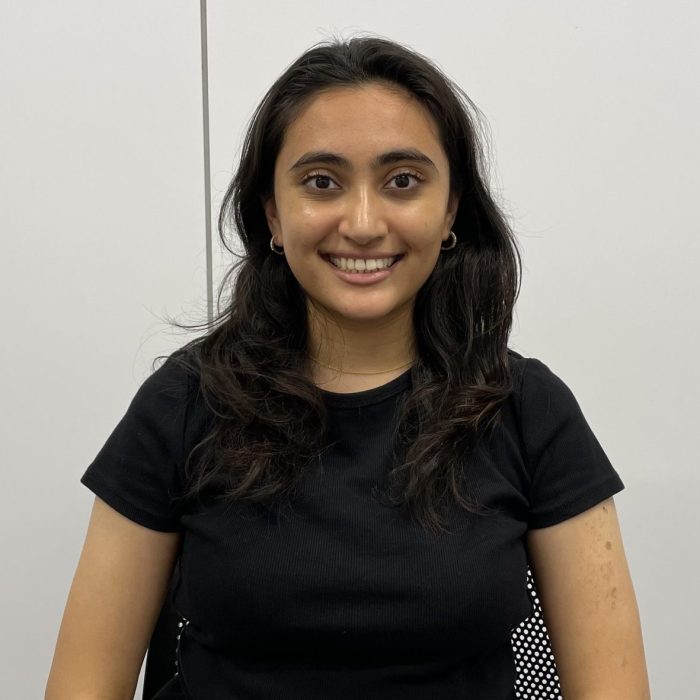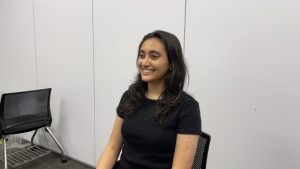I would love to see more women lead in mathematical expertise!
Harshita Chivukula
MS Year 4

Please tell us the reason for studying abroad in Japan and the reason for choosing the MSmajor of Waseda University.
Throughout my educational journey, I have sought experiences that teach me about the world we live in and skills that help me create social impact. The most important skill that I hoped to develop in my undergraduate pursuits was logical thinking – and what better major to pursue than mathematics! The decision to stay in Japan and simultaneously pursue mathematics was natural because although I am Indian, I have called Tokyo my home for my whole life. Mathematics is a field that has always intrigued me because of the interesting word problems in elementary school, the formulaic problem-solving approach in middle school, and the diverse usages in high school. Some people assume that I love math because I am Indian, and I do notice the irony of falling into that stereotype. However, through my upbringing and into college, I’ve found great joy in pushing myself to the limits (math joke alert). Waseda University offers just the platform to explore my interests in mathematics, even allowing students to explore its abstract nature in the form of engineering – something unique to Waseda.
Please tell us about the advangates of the department.
As a senior looking back on my university academic career, there are three clear plus points of the Department of Mathematics.
One, the sheer amount of exposure we get to the complex world of mathematics. Mathematics isn’t just calculus, statistics, and algebra, but also geometry, set theory, real analysis, and much more. There’s an entire plethora of topics that are all interconnected which Waseda students start to explore from the get-go. For example, through my final year seminar, I understood that measure theory and calculus sit at the foundation of probability theory. Through electives, we get to explore courses that are tailored to our specific interests in mathematics – the blend of physics and math, and business and probability, to name a few.
Two, I had the unique experience of working at the ICIAM Conference in 2023. This experience allowed me to sit in on expert-level research findings and learn from global math enthusiasts. These researchers showcased the diverse applications of mathematical research in space technology and cancer research, to name a few.
Three, the professor’s support. The mathematics department, especially the EBSE program, is a tight-knit department. I especially valued these small class sizes and student-to-teacher ratio as they allowed us to ask questions to professors easily and gave us a safe space for talking to peers. I’m especially thankful to Professor Trinh who has supported my journey in exploring probability and statistics and my vision in combining mathematics with business analytics. Over the last year and a half, I delved deeply into how probability and statistical models and tests can be applied to real-world data analysis in the Trinh Laboratory. I started with the foundational principles of probability theory, such as the probability space, probability measure, random variables, and probability distributions. Understanding these concepts was crucial as they provided the basis for analyzing uncertainty and variability in data. Building on this foundation, I then explored various regression models. These models, such as linear and logistic regression, allowed me to analyze relationships between variables and make predictions based on data. Additionally, I explored chi-square testing through a project on airplane wildlife strikes. This project taught me how to apply statistical tests to real-world data, interpret the results, and draw meaningful conclusions. By integrating probability theory with statistical analysis, I was able to handle uncertainty effectively and provide accurate predictions.
Is there anything you are passionate about except for academics during your student life?
As a student, especially during COVID-19, I found it immensely important to have passions that supported my mental health. Two such pursuits are singing, yoga, and cooking.
Conversely, I also found it important to develop passions that contributed to my future goals. I had been training my mind to solve issues logically through studying math – the “how” if you will. However, I used my time outside academics to explore the “why” – why do I want to work/create impact?
One of my passions is traveling and learning about new cultures and people. Through the Campus Asia Study Abroad Program, a Social Innovation program, pioneered by the Department of Social Sciences at Waseda, I was able to go to Nanyang Technological University, Singapore. Campus Asia provided the perfect platform to practice innovation and solution exploration through engagement with a diverse audience. Furthermore, it taught me that two disciplines of engineering and social sciences come hand-in-hand to create a foundation for innovation that the growth of societies relies on.
Other organizations I have been a part of are Google Developer Student Clubs (Waseda Chapter), an organization for tech enthusiasts, and Japan’s Venture Academy, a start-up community and boot camp for student builders/entrepreneurs. Through these experiences, I have been able to build skills and a network of students and working professionals to enhance my career prospects and future goal of social impact.
Please tell us about your future path and goals.
Following my time at Waseda, I will pursue a Master of Science in Business Analytics. Business analytics is a mix of mathematical skills with business innovation and cutting-edge technology – where abstract theories meet real-world solutions. Taking what I learned at Waseda, I hope to get one step closer to my long-term goal of creating social impact and have committed to doing so through business endeavors. By engaging in diverse, collaborative, and dynamic business environments, I hope to continue pushing the limits.
Please give a message to students aiming for MS major.
To prospective and admitted students:
 Math is not something you learn and forget; it’s embedded in everyday life and follows you everywhere like a hawk. Be prepared to mathematically challenge yourself through classes and laboratories that help you achieve your academic and career goals.
Math is not something you learn and forget; it’s embedded in everyday life and follows you everywhere like a hawk. Be prepared to mathematically challenge yourself through classes and laboratories that help you achieve your academic and career goals.
During my first two years at university, I experienced the challenges of remote learning due to COVID-19. However, as borders opened and my experiences transitioned from online to offline, I accessed the full scope of Waseda’s MS major beyond learning: the opportunity to build friendships and meet people from diverse fields and backgrounds. A huge part of the college experience that students forward to is networking, and as a math major at Waseda, there are numerous opportunities to meet new people, join clubs, and participate in internships. Embrace these opportunities—they are invaluable for both personal and professional growth.
To any female students planning on pursuing mathematics, do it! As the only female in my batch, I’ve always felt welcomed and capable. I would love to see more women lead in mathematical expertise!


